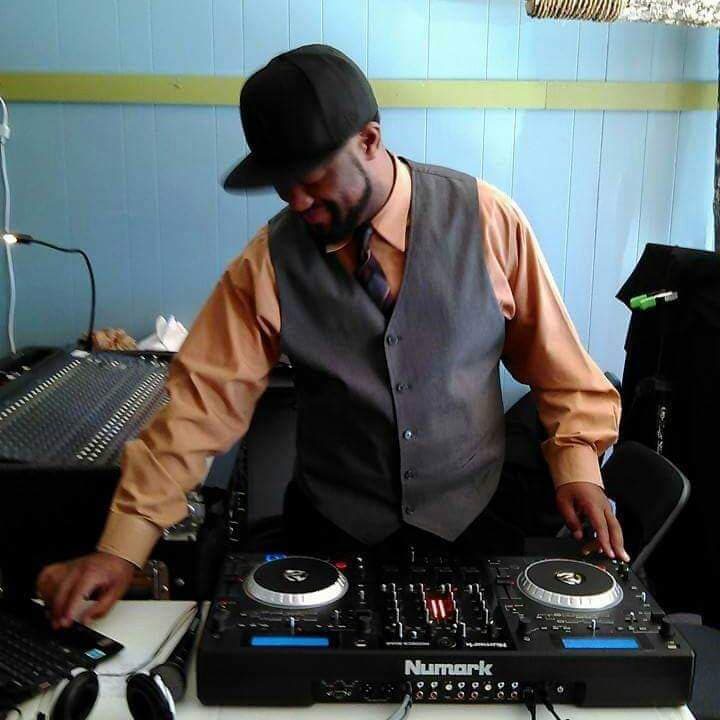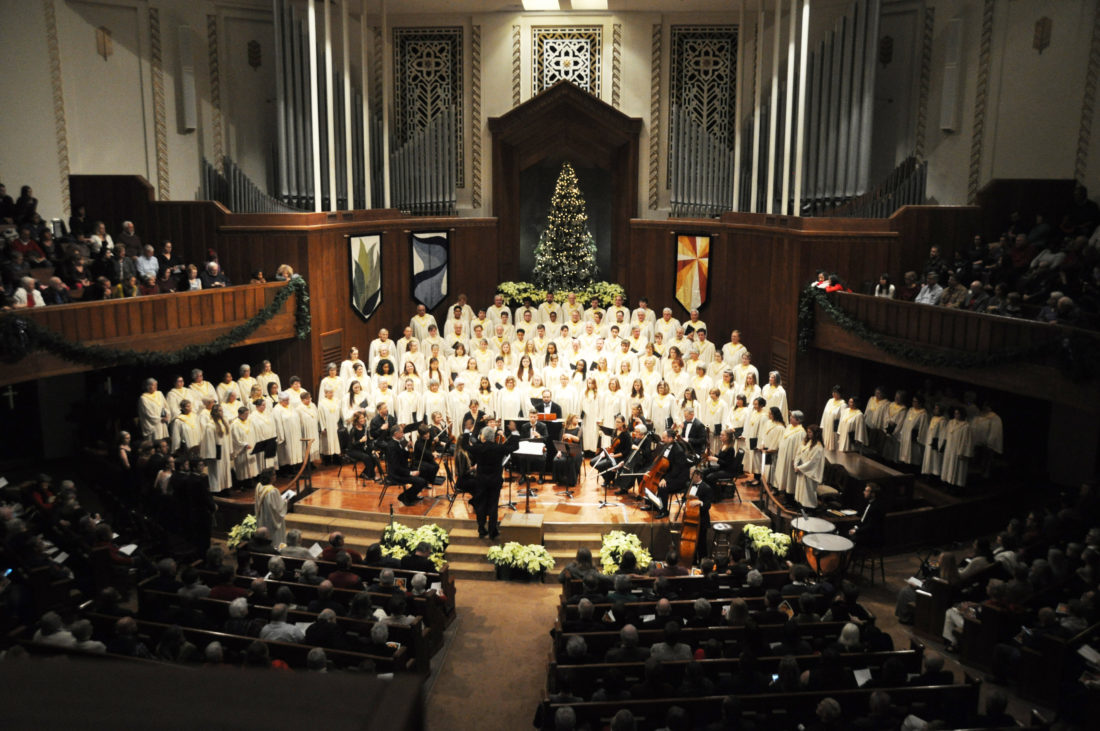By Alli Marshall and Edwin Arnaudin
For some listeners, music is a religious experience in and of itself. For others, song and instrumentation enhance spiritual practice, be it in the form of meditative chanting, energizing gospel choruses or biblically informed musicals. In this story, Xpress looks into the musical ministries of a number of local churches and explores what such programs, at the intersection of art and worship, offer to parishioners as well as secular fans of a good concert.
The joy of faith
During the monthly Bach’s Lunch concert series, organist Tate Addis performs “some very, very edgy stuff — what would be termed as dissonant, aleatoric, obtuse,” says Clark Sorrells, minister of music at the First Baptist Church of Asheville. That’s in addition to traditional pieces. The combination is great, says Sorrells, “because I don’t think you can put God in a box.”
In his 23 years at the local church, Sorrells has seen and created other edgy programming, such as a production of Jesus Christ Superstar (a risk, he notes, because it depicts Jesus in a very human way). Some highlights have included performances of Duke Ellington’s Sacred Concerts, the works of classical European composers such as Vivaldi and Puccini, and concerts of African American spiritual and mountain folk music — “a whole gambit of styles under the umbrella of celebrating the goodness of life, the joy of faith and the transcendence of God,” says Sorrells.
Aside from the faith-based programming, the iconic local church also includes secular music in its work, mainly in the form of its Academy for the Arts. The private and group music lessons and ensembles, including the Asheville Youth Choir, are open to students of all spiritual views. The school, which opened five years ago, evolved from the idea that “it seemed to be shortsighted to think we could only offer [the resources of the church] to those who were coming to worship God in Christian context,” says Sorrells. “The right thing to do is offer it to anybody in this community who wants to explore the artistic side of who they are.”
But he does see a direct correlation between music and spiritual practice. “The good thing about art is everyone experiences art in their own way,” he says. “There’s a long history, all the way back to biblical times, of people of faith expressing their worship, their aspirations, their longings, even their confessions, their despair through music.” First Baptist concert life is an extension of the Judeo-Christian tradition of music connecting human beings to God, Sorrells notes.
A recent holiday program by the 150-voice Asheville Youth Choir, The Time of Snow, explored “the surprising beauty of winter,” Sorrells says. “We often think of winter as being cold and barren and windy. … But in that time there’s this really unusual, unexpected beauty in that. In the same sense, the holiday season — no matter what faith perspective you bring to that — is a time when families are together, human relationships are celebrated [and ultimately] the best in people comes out in the holiday season.”
Learn more and find upcoming concerts at fbca.net. — A.M.
Scratches, samples and sermons
A music ministry doesn’t necessarily require a specific church or congregation. “You’re using whatever genre of music you’ve been called to do to represent and talk to people about Christ,” says Herman Bright, aka DJ Besbleve.
In 2007, after rededicating his life to Christianity, he asked what God wanted him to do, “and he said he wanted me to DJ.” At the time, Bright didn’t have any DJ equipment, and “I didn’t even know at that time Christian hip-hop existed.” So he started researching and connecting with artists making those sorts of tracks.

“I think hip-hop speaks to every generation. The particular [group] I’ve been called to reach is people who love hip-hop,” says Bright, who has, over the course of his career, DJed festivals, churches and secular nightclubs and has performed in most states throughout the Southeast. “Whenever I make a mixtape … it’s very prayerful. I’m always very cautious about what songs I put on a mixtape or, when I’m sampling stuff, what part of the song [God] wants me to use.”
Making a mixtape is similar to writing a sermon, Bright says. He meditates on it and references Scripture. “When I’m [onstage], it’s the typical DJ skills — I still scratch, I still mix, I still blend. But at the end of the day, it’s, ‘OK, Lord, what song comes next?’”
Despite his success, Bright found that some people in the church didn’t take his ministry seriously. So, in 2015, he was ordained as a preacher. Two years ago, he joined the New Birth Church of Asheville, where he fills in as a pastor or leads Bible study on occasion (he also preaches at other locations around Asheville).
Additionally, Bright — a longtime volunteer at Asheville FM and a contributor to that broadcaster’s “News Hour” — is preparing to launch a podcast and possible monthly live show on the station. “I think there needs to be a more community-centered Christian voice in Asheville,” he says. “There is a Christian voice here, but it doesn’t reach out to all of Asheville. … That’s what me and my homeboy Craig ‘White Ice’ Conner hope to bring with this radio show.”
He adds, “So many Christian hip-hop artists have a need to make it nationally. … My focus has always been ‘What can I do to better the community I live in?’ … There’s so much work you can do right here.”
Find music and follow DJ Besbleve at soundcloud.com/besbleve. — A.M.
Pop hymns
Before becoming minister of music at Jubilee! Community, Daniel Barber gained professional experience in social work, research methodology, activism and video production.
“I’ve spent most of my life figuring out how to leverage my small amount of human energy to make the biggest impact in the world,” Barber says. “And over the last 18-19 years, I’ve been reconnecting to music and using music in ritual, like at Jubilee and other places, not only because it’s rewarding and gratifying for me, but because it’s such a powerful way to bring people together.”
Though he considers “ministry” to be a loaded word and hasn’t been “drawn to ministry for ministry’s sake,” Barber says he’s always been attracted to service and the essence of what ministry really is about. As the leader of Jubilee’s World Beat Band — which unites piano, bass, electric bass, electric guitar, drums, saxophone and vocals — Barber selects the songs played during the prelude and postlude at each Sunday service. The minister of ritual, Amy Steinberg, picks the music for the ritual itself.
Both attempt to choose works that fit the particular service’s theme, and while traditional Christian music is occasionally worked in, the services typically feature well-known pop songs by The Beatles, Stevie Wonder, Mumford & Sons, Sara Bareilles and other artists. One memorable Sunday, Barber got to realize a long-held dream of playing The Rolling Stones’ “Sympathy for the Devil” in a church setting when a guest minister spoke on the topic of demons.
“We look for the song that, in an artistic way, touches on these interesting experiences that we all have as humans and find ways to bring it in and make it sacred and make it holy by making it a part of our whole experience as humans,” Barber says. “Just the fact that it’s here in a — we don’t even call it ‘church,’ but it’s in a sacred container — and just by bringing it into that sacred container in a circle with each other around an altar, it becomes sacred.”
Barber views music as “a bridge between matter and spirit,” helping people link “what we understand and what we sense and detect” but are unable to fully grasp. By accessing parts of ourselves that “are sitting right there,” be it through meditation, yoga or a musical groove, he feels that people can better learn that their bodies are blessed and enjoy the simple experience of being.
“We’re not in an original sin situation — we’re in an original blessing situation,” he says. “We’re blessed just to get to be here and allow ourselves to relax into that a little bit more. Music is a really good way to move down that road.”
Learn more at jubileecommunity.org. — E.A.
Variety show
“We deal with social justice and planet issues … so the music always has to fit, whether it’s instrumental or vocal music,” says Leslie Downs, music director at the Unitarian Universalist Congregation of Asheville. “That’s really my job — figuring out what the choir can sing that will enhance what the minister is speaking about or, if I hire a guest artist … who’s going to be the best fit musically.”
Downs was raised in the Baptist church, where he also played piano (he went on to perform extensively as a soloist and collaborative artist in many styles as well as teaching music and voice). The UU church is a departure from Downs’ traditional upbringing: “We have members who identify as Christian, atheist, agnostic. We have some members who are Jewish. … We come together for different reasons,” he explains. So, while some denominations follow a liturgy, at the UU church, to address the needs of its theologically diverse membership, “We have a monthly theme, but we make it very broad.”
Downs has just begun his fourth year as music director, a position that has expanded during his tenure. “What I like is that, in the Unitarian Church, we’re able to do a huge variety of music,” he says. “Some of it may be sacred, but we use a lot of secular music. And we have a wide range of styles, all the way from classical to pop to musical theater and occasionally some gospel music thrown in.”
And, while attempting to meet the tastes of the congregation, Downs has also found space for his own expression. “It’s unusual for a UU church to celebrate the birth of Jesus,” he reveals. “But our church has a tradition of having two services on Christmas Eve.”
The early program involves a pageant, and before the later candlelight service, “I started a tradition of doing a mini-concert that features the choir, and we do arrangements of Christmas carols. … I bring that from my Baptist tradition.”
While the work of curating the music for a worship service may be complicated, the goal is simple. “I think the music should always be uplifting,” Downs says. “It’s different for every person, but you want to reach people in a way that helps them connect with any kind of feeling that’s positive. You want people to feel renewed when they leave a service.”
Learn more at uuasheville.org. — A.M.




Before you comment
The comments section is here to provide a platform for civil dialogue on the issues we face together as a local community. Xpress is committed to offering this platform for all voices, but when the tone of the discussion gets nasty or strays off topic, we believe many people choose not to participate. Xpress editors are determined to moderate comments to ensure a constructive interchange is maintained. All comments judged not to be in keeping with the spirit of civil discourse will be removed and repeat violators will be banned. See here for our terms of service. Thank you for being part of this effort to promote respectful discussion.